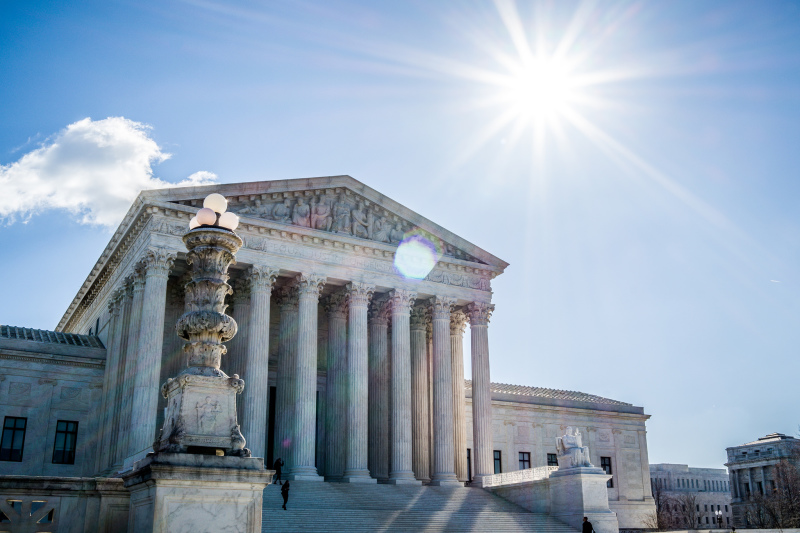
The outcome of a case currently before the U.S. Supreme Court regarding pension plans may dramatically affect hospitals, schools, and other non-profits with religious affiliations across the country, according to lawyers involved in the case.
The case, Advocate Health Care Network v. Stapleton, involves hospital employees and three religiously affiliated hospitals: Advocate Health, St. Peter's Healthcare System, and Dignity Health.
The employees argue that their employers have violated a 1974 law called ERISA (Employee Retirement Income Security Act) by not funding their pension plans sufficiently, and not communicating procedures related to the plan, among other violations.
But the hospitals argue that they are exempt from ERISA because of what is known as a "church plan exemption," under which churches and other organizations with church ties have been able to forego the ERISA requirements.
During oral arguments before the Supreme Court on Monday, the question of whether these hospitals, and other organizations with religious ties, should have that exemption was the central point of deliberation. Do religiously affiliated hospitals and organizations such as schools, daycare centers, or charities count as "church"? If not, does the statute still exempt pension plans that are maintained by religiously affiliated organizations?
Should the Supreme Court rule against the hospitals, they would be compelled to pay significant amounts in premiums, according to Eric Baxter of Becket, a law firm which argued on behalf of the hospitals, adding that many non-profits may even need to close their doors.
Baxter argued that church can't only be seen as a place that holds religious services, and that the service aspect carried out by religious non-profits is a crucial part of what defines church.
"Churches aren't just organizations that conduct worship," Baxter was quoted by Religion News Service as saying. "Churches go out and serve the most needy among us and they shouldn't be penalized because they preach on Sunday and practice it during the week."
It is unclear how the Supreme Court will rule, and at one point during the oral arguments, Justice Sonia Sotomayor said frankly that she is "torn" as to how to interpret the statute.
"This could be read either way in my mind," she said.
Sotomayor was referring to the two different ways that the definition of "church plan" has been interpreted. The statute definition of what counts as a "church plan" has two portions. First, pension plans "established and maintained" by a "church or by a convention or association of churches" count as a church plan.
But the second portion is at issue in this case. It expands the definition of "church plan" and says that a pension plan "established and maintained" by a church "includes a plan maintained by an organization "¦ if such organization is controlled by or associated with a church or a convention or association of churches."
"The text does not require a church to establish benefit plans for someone else's employees," Lisa Blatt of Becket, who represented the hospitals, asserted during the oral arguments. In other words, as long as the pension plan is maintained by a religiously affiliated organization, it doesn't have to have been established by a church.
James Feldman from Washington, who represented the employees, argued that a "church plan has to be "¦ established and maintained by a church."
"It needs to fit both criteria," he said.
If religiously affiliated organizations count as a "church," then they would be exempt from ERISA regardless of how that second portion is interpreted. But if only houses of worship that have religious services count as "church," the interpretation of that portion could be crucial as to whether those organizations could still have a church plan exemption.
Justice Stephen Breyer asked Feldman at one point about Little Sisters of the Poor, and whether its pension plan would be exempt in varying scenarios - if it were established by the Catholic church, or not, etc. Here's the tail end of that portion of the arguments:
Justice Breyer: But I mean, if it's a legitimate organization, like, let's say the Little Sisters of the Poor, really affiliated with the church, you know, really affiliated with the church, they do have a lot of involvement -
Mr. Feldman: And if they really are part of the church, I would add one other thing. If they really are -
Justice Breyer: Yes, they really are the church, and they retained a - purpose.
Mr. Feldman: - part of the church and they can qualify as a church, that's fine.
Meanwhile, Justice Sotomayor questioned whether large hospitals like Dignity Health - which employs some 60,000 people - could be considered a "church" when they function almost the same way as any other non-religious hospital, and whether it was the intention of Congress to allow such hospitals to opt out of providing protections in their employees' pension plans.
"Do you think Congress had in mind a - corporations that are essentially like every other corporation except they're not for profit? I mean, these hospitals, some of them, like Dignity, the Catholic church has disavowed any formal affiliation with it," said Sotomayor.
"They're not doing anything different than any other hospital - or care center," she went on. "Do you believe that Congress's vision was to let, what is essentially, a corporate entity opt out of protecting all of those employees?"
So far, the Third, Seventh, and Ninth Circuit Courts of Appeal have ruled in favor of the employees. However, several federal district courts have ruled in favor of the hospitals.
The Supreme Court is set to rule on the case by June 30.



















